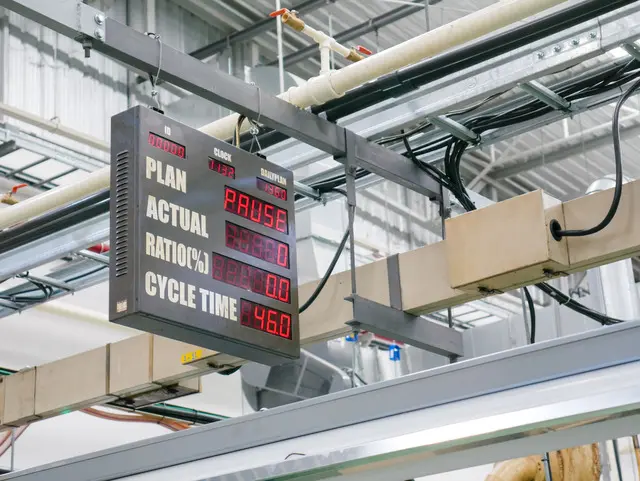Order Processing Automation: Empowering Manufacturing with Precision and Efficiency
In the fast-paced manufacturing industry, where efficiency and accuracy are paramount, automating order processing is no longer a luxury but a necessity. Order Processing Automation (OPA) streamlines and accelerates the order-to-fulfillment process, minimizing manual errors and delays that can hinder productivity and customer satisfaction.
By harnessing the power of Python, Artificial Intelligence (AI), and cloud-based solutions, manufacturers can elevate their OPA capabilities. Python’s versatility and AI’s cognitive abilities enable automated order entry, confirmation, and processing, freeing up human resources for more strategic tasks. Cloud-based solutions provide scalability and accessibility, allowing manufacturers to seamlessly integrate their OPA systems with CRM platforms for comprehensive order management and tracking.

Python, AI, and Cloud: The Trinity of Order Processing Automation
Python: The Foundation of Unattended and Attended Bots
Python’s versatility shines in developing both unattended and attended bots for OPA. Unattended bots, powered by Python’s automation capabilities, can autonomously execute repetitive tasks such as order entry, confirmation, and processing, freeing up human resources for more complex tasks. Attended bots, on the other hand, collaborate with human operators, providing real-time assistance and automating specific tasks within the OPA workflow. Python’s flexibility allows for the customization of these bots to meet the unique requirements of each manufacturing process.
Cloud Platforms: Orchestrating Automation at Scale
Cloud platforms transcend the limitations of traditional RPA/workflow tools by offering a comprehensive suite of features and capabilities. They provide the infrastructure and tools necessary for orchestrating complex automation workflows, including OPA. Cloud platforms enable manufacturers to scale their automation efforts effortlessly, accommodating the growing volume and complexity of orders.
AI: Enhancing Accuracy and Handling Edge Cases
AI plays a pivotal role in improving the accuracy and efficiency of OPA systems. Techniques like image recognition can automate the processing of purchase orders, eliminating manual data entry errors. Natural language processing (NLP) empowers bots to understand and interpret unstructured data, enabling them to handle complex inquiries and edge cases. Generative AI can generate responses to customer queries, providing real-time support and improving the overall customer experience. By incorporating AI into their OPA systems, manufacturers can enhance accuracy, reduce processing times, and improve customer satisfaction.

Building the Order Processing Automation Engine with Python and Cloud
Deconstructing the Automation Process
The OPA process encompasses several key subprocesses:
- Order Entry: Capturing order details from various channels (e.g., email, web forms, EDI) and validating them for accuracy.
- Order Confirmation: Sending order confirmations to customers, providing order details and estimated delivery dates.
- Order Processing: Processing orders, allocating inventory, and generating invoices and shipping documents.
- Order Tracking: Providing real-time visibility into the status of orders, from placement to delivery.
Automating Subprocesses with Python and Cloud
1. Order Entry: Python scripts can extract data from emails, web forms, and EDI documents, validating it against predefined rules. Cloud platforms provide storage and computing resources to handle large volumes of orders.
2. Order Confirmation: Automated emails can be triggered to send order confirmations, using Python to personalize the messages with order details. Cloud platforms ensure reliable and timely delivery of emails.
3. Order Processing: Python scripts can integrate with inventory management systems to allocate inventory and generate invoices and shipping documents. Cloud platforms provide scalability and fault tolerance for handling high-volume order processing.
4. Order Tracking: Cloud platforms offer real-time data storage and analytics capabilities, enabling the tracking of order status at each stage of the fulfillment process. Python scripts can generate reports and notifications to keep customers informed.
Data Security and Compliance in Manufacturing
Data security and compliance are paramount in manufacturing. Python and cloud platforms provide robust security features, including encryption, access control, and audit trails, to safeguard sensitive data. Compliance with industry regulations, such as ISO 27001 and NIST 800-53, can be achieved through the use of these technologies.
Python vs. No-Code RPA/Workflow Tools
Compared to no-code RPA/workflow tools, Python offers:
- Greater Flexibility: Python’s open-source nature allows for customization and integration with diverse systems and data sources.
- Scalability: Python scripts can be easily scaled to handle large volumes of orders and complex automation workflows.
- Cost-Effectiveness: Python is a free and open-source language, eliminating licensing costs associated with proprietary RPA tools.
Algorythum’s Approach: Empowering Clients with Python Expertise
Algorythum recognizes the limitations of off-the-shelf automation platforms and advocates for a Python-based approach. Our team of Python experts leverages their deep understanding of the language and its capabilities to deliver tailored OPA solutions that:
- Meet Specific Business Needs: Python allows us to customize automations to align precisely with each client’s unique requirements.
- Ensure Scalability and Performance: Our Python-based solutions are designed to handle high-volume order processing and complex workflows efficiently.
- Provide Long-Term Value: Python’s open-source nature and continuous evolution ensure that our automations remain adaptable and future-proof.

The Future of Order Processing Automation
The convergence of Python, AI, and cloud technologies is driving the future of OPA towards even greater efficiency, accuracy, and customer satisfaction. Potential extensions to the proposed solution include:
- Cognitive Automation: Incorporating advanced AI techniques to automate complex decision-making processes and handle exceptions intelligently.
- Predictive Analytics: Leveraging AI to analyze historical data and predict future trends, enabling proactive order fulfillment and inventory management.
- Blockchain Integration: Utilizing blockchain technology to create a secure and transparent record of order transactions, enhancing traceability and accountability.
Subscribe to our newsletter to stay updated on the latest advancements in OPA and other industry-specific automation solutions. Contact our team today for a free feasibility assessment and cost estimate tailored to your unique requirements. Together, we can unlock the full potential of OPA and transform your manufacturing operations for the future.

Algorythum – Your Partner in Automations and Beyond
At Algorythum, we specialize in crafting custom RPA solutions with Python, specifically tailored to your industry. We break free from the limitations of off-the-shelf tools, offering:
- A team of Automation & DevSecOps Experts: Deeply experienced in building scalable and efficient automation solutions for various businesses in all industries.
- Reduced Automation Maintenance Costs: Our code is clear, maintainable, and minimizes future upkeep expenses (up to 90% reduction compared to platforms).
- Future-Proof Solutions: You own the code, ensuring flexibility and adaptability as your processes and regulations evolve.









